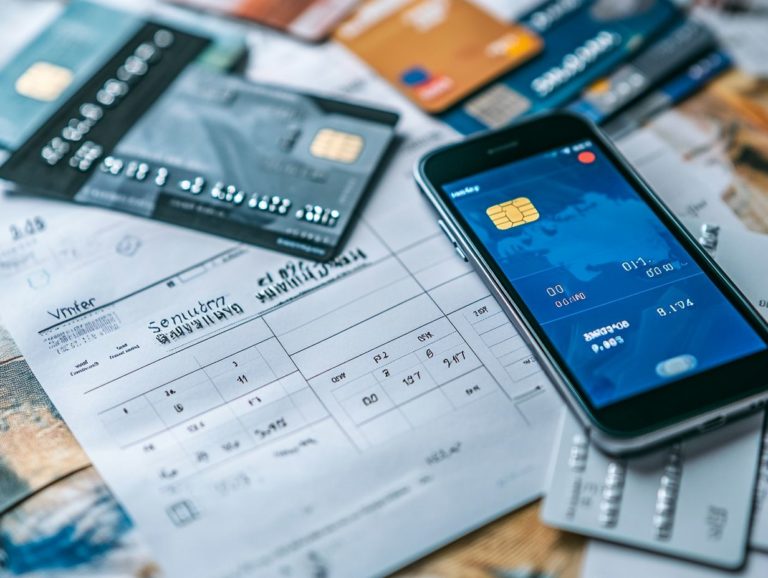The Role of Rewards Cards in Personal Finance
Rewards cards have emerged as a compelling tool in personal finance, allowing you to earn points, cash back, and other enticing perks through your everyday spending.
But what precisely are rewards cards, and how do they operate?
This article delves into the various types of rewards cards available, the benefits they bring, and how to select the one that aligns best with your financial objectives. It offers strategies for maximizing your rewards, points out potential pitfalls, and discusses alternatives if rewards cards don t quite match your needs.
Whether you re a seasoned rewards card aficionado or just beginning to explore the landscape, you ll uncover valuable insights to enrich your financial journey.
Contents
Key Takeaways:

- Rewards cards can help you earn points and perks on your everyday purchases. They are valuable tools for managing personal finances.
- When choosing a rewards card, consider factors such as your spending habits, the type of rewards offered, and any potential hidden fees or traps.
- Maximizing the benefits of rewards cards requires careful planning and strategizing while being aware of potential pitfalls. Alternatives to rewards cards should also be considered for managing finances.
Understanding Rewards Cards
Understanding rewards cards is essential in today’s financial landscape, as they present unique benefits that can significantly enhance your personal finances and spending habits.
These credit cards come equipped with various rewards programs think cash back and travel rewards. They can lead to smarter financial decisions and help you achieve your financial goals.
By leveraging attractive sign-up bonuses and understanding your credit score (a number that shows how well you pay back loans), you can manage credit card debt effectively while enjoying perks such as robust fraud protection, seamless expense tracking, and convenient mobile banking features.
What are Rewards Cards?
Rewards cards are specialized credit cards designed to give you the opportunity to earn enticing rewards like cash back and travel points for your everyday purchases.
These cards typically work by offering you a certain percentage of cash back on your purchases or points for travel for every dollar you spend. This creates a compelling reason to spend responsibly. You can choose from various types of rewards, whether you prefer straightforward cash back that’s easily redeemable or travel rewards that can help fund your next getaway.
Integrating rewards cards into your personal finance strategy can be a savvy way to optimize your expenses while also building your credit history. Understanding the basics of rewards credit cards is essential, as it’s important to manage these cards wisely to avoid interest charges, allowing you to fully enjoy the benefits while maintaining your financial well-being.
Types of Rewards Cards
You ll find a variety of rewards cards available, each designed with distinct benefits to match different spending habits, like cash back cards and travel rewards cards.
Cash back cards offer a straightforward approach for you to earn money back on everyday purchases, making them particularly attractive if you prefer simplicity in rewards. Conversely, travel rewards cards are tailored for those who frequently travel, allowing you to accumulate points for flights, hotel stays, and other travel-related expenses.
Each type of card corresponds to specific financial behaviors. For example, if you spend heavily on groceries, cash back offers may work best for you, while a frequent flyer could maximize travel rewards through strategic use of their cards.
Grasping the nuances of each card can greatly enhance your financial management, as leveraging rewards can help offset expenses and ease any financial burdens.
Benefits of Using Rewards Cards
Utilizing rewards cards can provide you with a multitude of benefits that significantly support your financial goals while enhancing your budgeting capabilities. Understanding what you need to know about rewards cards can serve as a valuable asset in your personal finance management toolkit.
Ready to maximize your spending? Dive into the world of rewards cards and start reaping the benefits today!
Earning Points and Rewards

You earn points and rewards with rewards credit cards based on your daily spending. Every purchase helps you accumulate cash back or travel rewards.
This means that whether you re picking up groceries, filling your gas tank, or enjoying a meal out, every transaction can boost your rewards balance. Different credit cards have various reward structures; some may offer a specific cash back percentage for every dollar spent, while others provide bonus points in categories like travel or dining.
As you gather these points, you can redeem them for benefits like statement credits or free flights, depending on the card s partnerships with airlines or other rewards programs.
Additional Perks and Benefits
Along with earning rewards, many rewards credit cards offer enticing perks such as robust fraud protection, no annual fees, and balance transfer options. These features are appealing for everyday consumers who want to maximize their financial advantages.
Fraud protection keeps you safe from unauthorized transactions, granting you peace of mind while shopping. Even if some cards have annual fees, there are plenty of options available without such costs, allowing you to enjoy rewards without extra financial burden.
Balance transfer features help you consolidate and manage debt more effectively. This can save you on interest and streamline your financial commitments. These amazing benefits can significantly boost the value of your rewards card!
How to Choose the Right Rewards Card
Selecting the right rewards card requires thoughtful consideration of various factors. You need to weigh your financial decisions, evaluate your credit score, and assess how annual fees might influence your overall credit card debt.
Making the right choice can significantly enhance your financial landscape.
Factors to Consider
When selecting a rewards credit card, consider your personal finances and spending habits. Analyze how the card aligns with your financial goals.
Also, scrutinize the interest rates associated with the card; high rates can quickly undermine any rewards you earn. Evaluating the rewards structure is also important; some cards offer elevated points for specific categories like dining or travel, which could be more advantageous based on your spending habits.
Your individual financial situation, including existing debts and monthly budgets, plays a crucial role in determining whether a rewards card will help your financial journey or complicate it further.
Maximizing Rewards Card Benefits
To truly maximize the benefits of rewards cards, you need to employ effective tips and strategies that enhance your accumulation of rewards while upholding sound budgeting practices.
Tips and Strategies for Maximizing Rewards

To truly maximize the benefits of rewards credit cards, cultivate effective spending habits and utilize budgeting tools that align with your financial goals, while seizing cash back opportunities.
By focusing on specific categories like groceries, dining out, and travel, you can strategically channel your spending into areas that yield higher rewards. Many credit cards offer elevated rewards rates in these categories, making it essential to know where to allocate your expenses.
Using budgeting apps helps you set spending limits, track purchases in real-time, and uncover spending patterns. This proactive approach amplifies your rewards potential and fosters better financial health, giving you a clearer overview of your overall expenses.
Potential Pitfalls of Rewards Cards
While rewards cards present alluring benefits, they also carry potential pitfalls that can lead to credit card debt and regrettable financial choices if not managed carefully.
Hidden Fees and Traps to Avoid
Rewards cards often come with hidden fees and high interest rates that can ensnare unsuspecting users. This can potentially lead to poor financial choices.
Many individuals tend to overlook foreign transaction fees. These are extra charges for purchases made outside your home country. These fees can add up quickly, especially when traveling or shopping online from overseas.
If not managed properly, annual fees can significantly erode the benefits of earning cash back or points. It s essential for you to read the fine print diligently to identify these charges and take proactive steps to minimize them. Consider seeking cards that waive these fees or offer competitive annual fee structures.
Maintaining discipline in your credit card usage is crucial for avoiding debt accumulation while still enjoying the perks these rewards cards have to offer.
Alternatives to Rewards Cards
Discovering alternatives to rewards cards unlocks exciting new possibilities for your finances! By considering these options, you can work toward achieving your financial goals without the burden of accumulating credit card debt.
Other Options for Managing Finances
You have a wealth of options for managing your personal finances effectively. This includes a range of budgeting tools and strategies tailored to your financial goals, all without the need for rewards cards.
One practical approach is to harness the power of free online budgeting apps. These apps enable you to track your income and expenses in real-time. They often come packed with features like expense categorization and visual reports, making it easy to spot spending patterns and identify areas for improvement.
Adopting strategies such as the 50/30/20 rule can further simplify your budgeting process. This approach allocates specific portions of your income to needs, wants, and savings. By focusing on these methods, you can cultivate a more organized financial life, paving the way for enhanced financial stability and the successful achievement of your long-term objectives without the lurking temptation of credit card debt.
Frequently Asked Questions

How do rewards cards help with personal finance?
Rewards cards play a crucial role in personal finance. They allow individuals to earn points, cashback, or other rewards for their purchases, which can then be redeemed for various benefits. Understanding the impact of credit card rewards is essential for maximizing these benefits.
How do rewards cards benefit personal finances?
Rewards cards benefit personal finances in several ways. They provide cashback or points on everyday purchases, helping to save money on travel or other expenses. To make the most of these benefits, it’s important to explore understanding credit card reward programs, which can even improve credit scores through responsible use.
Are there different types of rewards cards available?
Yes, there are various types of rewards cards available. These include cashback cards, travel rewards cards, and points-based cards. It is essential to research and find a card that aligns with your spending habits and financial goals.
Do rewards cards come with any fees?
Some rewards cards may come with annual fees. Others may have no fees at all. It is crucial to compare the fees and benefits of different cards to determine which one would be the most cost-effective for your personal finance needs.
How do I maximize the benefits of my rewards card?
To maximize the benefits of your rewards card, use it for everyday purchases and pay off the balance in full each month. Keep track of special offers and promotions to earn even more rewards.
Can rewards cards be detrimental to personal finances?
While rewards cards can provide numerous benefits, they can also be detrimental to personal finances if not used responsibly. It is crucial to avoid overspending and only use rewards cards for purchases that fit within your budget.






